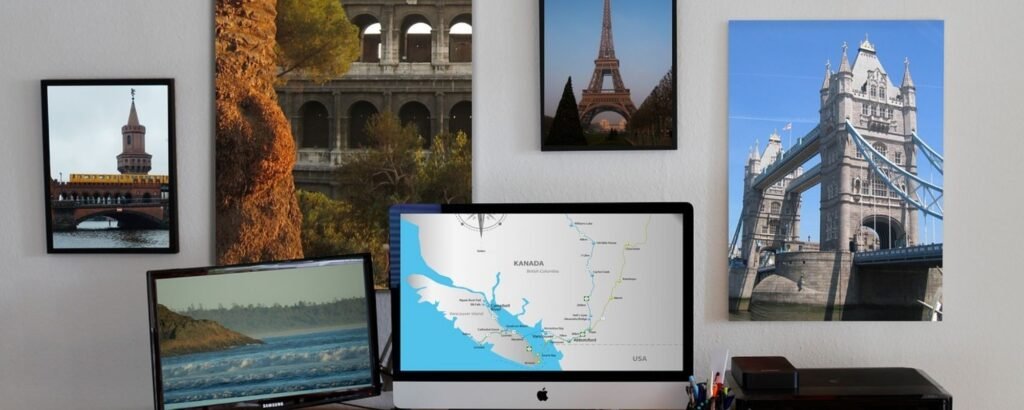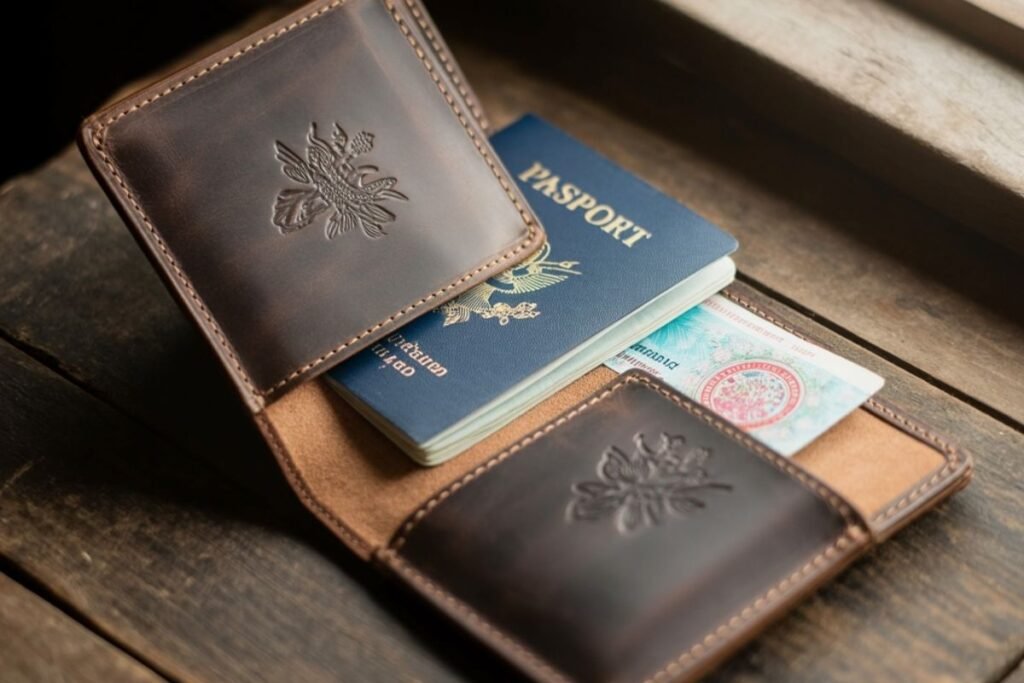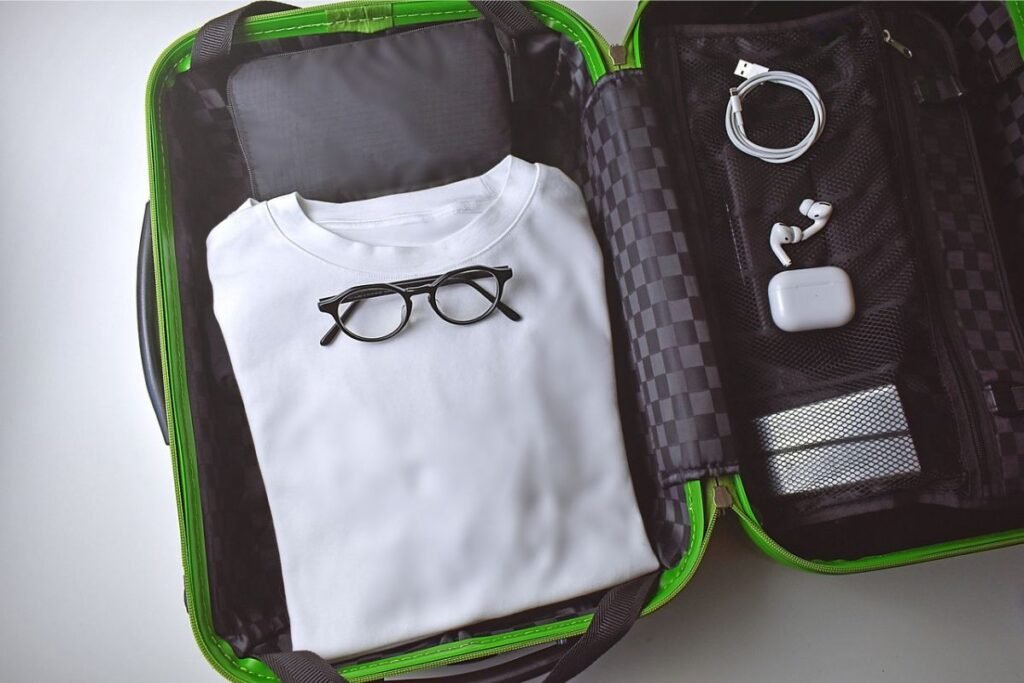
Travelling abroad is one of life’s most enriching experiences — a chance to discover new places, cultures and flavours. But when you’re far from home, even small oversights can turn into unnecessary hassles. Think of this checklist as a friendly nudge from us: a set of essential tips to keep things simple, stress-free and focused on the magic of exploring the world.
These are little lessons we’ve learned along the way on our overseas adventures. We’ve shown up to collect a rental car only to realise a driver’s licence was missing, carefully filed insurance documents but couldn’t access them in Egypt without data. And learned the hard way about visas when we forgot to complete one online in Malaysia and ended up waiting nearly two hours in line just to fill out a very small form.
We’re still learning (global travel has a way of surprising you no matter how much you plan), but putting this checklist together means you don’t have to repeat the same mistakes. If it makes your adventures smoother, then it’s done its job.
Table of Contents
🛡️ Secure Travel Insurance (Better safe than sorry)
- Why it matters: Covers accidents, illness, missed flights, cancelled tours, lost baggage, theft, terrorism, emergency evacuation.
- Who should get it: Especially important if you have prepaid bookings, non-refundable tickets, existing health needs or you’re visiting remote/high-cost destinations.
- What to buy: A comprehensive policy (trip cancellation & interruption, medical, evacuation, baggage, flight) that acts as primary cover.
- Typical cost: Around 5–10% of trip cost for standard cover; 20–50% for premium/expanded cover. Price varies by age, trip length, activities.
- How to choose (quick checks):
- Medical cap & evacuation limits are high enough
- Pre-existing conditions covered (in writing)
- Adventure activities included if relevant
- Rental car excess, baggage/item limits, and exclusions
- 24/7 emergency line + easy claim process
- Claim tips: Report issues ASAP, keep receipts and photos, get police/airline reports for theft/loss and contact the insurer before major treatment or evacuation when possible.
- Keep copies: Store your policy PDF + emergency numbers on your phone and in the cloud; carry one printed copy. I also highly recommend laying out everything you’re taking with you and taking photos — it makes the claims process much easier if anything is lost or stolen.
Many insurers offer solid options and some credit cards include complimentary cover, so always check first.
🌍 Travel Documents
Before you set foot on the plane, it’s worth double-checking your paperwork. Nothing derails a trip faster than an expired passport or missing visa. A few extra minutes at home saves hours of headaches abroad.

- Passport validity – Many countries require your passport to be valid for at least six months beyond your return date. Airlines can refuse boarding if it doesn’t meet the entry requirements, so check early and renew well before your trip.
- Visas – Requirements vary from country to country. Some allow visa-free entry, others need you to apply online in advance and a few still issue visas on arrival. Always confirm the rules for your destination. If an online option is available, take it — we once forgot to complete one for Malaysia and ended up waiting nearly two hours in line just to fill out a small form.
- Copies & backups – Keep both digital and printed copies of your important documents: passports, visas, travel insurance, flight details and accommodation bookings. Save them in cloud storage (Google Drive, iCloud, Dropbox) and email a set to yourself. Carry one printed copy in a small folder or document wallet. Having backups ready makes life much easier if you lose your bag or need to show details without Wi-Fi.
🛫 At the Airport
Airports can feel chaotic, but arriving prepared makes everything smoother. Take a breath, give yourself time, and treat it as the first step of your adventure rather than a hurdle. We always arrive 3–4 hours early for international flights — it’s better to get through and relax on the other side than to be stressed in a long queue. Some airports are especially hectic (like Fiumicino in Italy, Paris, Hawaii, London, and Cairo in Egypt) and not knowing the layout, the language or how far your gate is from customs can make a big difference.
- Arrive early – Allow plenty of time for queues, delays or last-minute hiccups.
- Liquids & luggage – Stick to the 100ml liquid rule:
- Each liquid, gel, cream or aerosol must be in a container of 100ml or less.
- All containers must fit inside a 1 litre clear resealable bag (about 20cm x 20cm).
- You’re allowed one bag per passenger.
Keep large toiletries in checked luggage or buy travel-sized replacements after you land
- Onward tickets – Some countries require proof of onward travel. Keep a printed or digital copy handy. When we travelled around the world with separate bookings, we couldn’t use the self-check-in kiosks and had to go to the counter so staff could physically sight our exit ticket. Don’t be surprised if this happens — it’s standard procedure.
🛍 Duty-Free & Transit Lounges
Layovers and airport waits don’t have to feel wasted — they’re a chance to stretch, reset and maybe pick up a small treat before your next flight.
- Know your allowance – Duty-free limits vary by country. If in doubt, ask at the counter — staff will know what you can take into your next destination.
- Transit time – Use layovers wisely: walk, hydrate and find a comfortable spot to relax. If you have a Priority Pass, airport lounges are a great option. Many airports also allow you to pay a fee to enter lounges even without a membership.
- Terminal changes – Follow signs and ask staff (look for those in high-viz jackets) if you’re unsure. In some places — like airports in Egypt — things can feel chaotic. Don’t be afraid to ask for help; just know that sometimes assistance may come with a small tip expected.
🏥 Health & Safety
Your wellbeing is the most important luggage you carry. A little preparation now means you can enjoy yourself later without stress.

- Travel insurance – Make sure your policy covers medical care, cancellations and lost luggage. (See the full notes in the insurance section above.)
- Vaccinations – Check if any are required or recommended for your destination. A quick Google search for “Travel Vaccinations + [country]” will give you a list. Book an appointment with your GP or a travel doctor well in advance.
- Medications – Pack a small first-aid kit and enough prescription medicine for the entire trip. Some countries require a list of your medication — keep a printed copy with your passport documents.
💰 Money Matters
Money isn’t the heart of travel but sorting your finances in advance helps everything else flow. A little planning means fewer headaches and more time for making memories.
- Avoid debt – Travel within your means. Coming home to financial stress can overshadow even the best adventures.
- Currency – Airport exchanges are almost always a rip-off. If needed, change a small amount on arrival for immediate expenses, then use ATMs or local exchanges in town for better rates. Check withdrawal fees with your bank before you go and make a few larger withdrawals rather than many small ones.
- Cards & cash – Informing your bank of your itinerary means smoother transactions abroad and faster support if anything goes wrong. Their security team can also monitor suspicious activity and contact you quickly if something looks wrong. Carry a mix of local currency and small USD bills, which are accepted in many places. Don’t keep all your money in one spot.
- Travel cards – Wise and Revolut are excellent options for international travellers. Wise is widely accepted worldwide, while Revolut is particularly good in Europe but not as strong in parts of Asia. Both make currency conversion and payments easier and cheaper than banks. A great feature is the ability to transfer money quickly in case you need funds from family or friends.
- Budget apps – Use simple apps like My Money to track spending and avoid nasty surprises. Even jotting costs down in notes helps you stay on budget.
- Smart card usage – If available in your country, a travel rewards credit card (like AMEX) can be a great asset. Depending on the card, you may get airpoints, complimentary travel insurance, discounts on flights and accommodation, or even cash-back on everyday spending.
📱 Staying Connected
Staying in touch can be both a safety net and a joy — whether it’s hearing a familiar voice, sharing a laugh over text, or sending photos to loved ones. Think of it as carrying a little piece of home in your pocket.

- SIMs & eSIMs – Local simcards or eSIMs (like Airalo) are usually cheaper than roaming. Some phones don’t support dual SIM — eSIMs like Airalo are a good solution. Dual SIM, if available, is handy for keeping your home number. Pro tip: dual SIM is a lifesaver for receiving those verification texts from banks or email accounts.
- Key contacts – Save embassy numbers, emergency services and your accommodation details. Some countries (like China and the USA) require a list of places you’ll be staying — having it printed means you’re not scrambling on your phone at the counter.
- Travel apps – Download what you need before you leave home while you have reliable internet. Offline maps, translation tools and ride-share apps are essentials. Do a little research by country — in China, for example, you’ll want Didi for rides and Alipay/Apple Pay for payments.
- 💡 Pro tip: If you’re on a cruise ship, mobile data is expensive — save it for emergencies or bank verification texts when making purchases in port.
✨ Convenience & Comfort
- Mobile chargers – Phones are your maps, translators and planners, so don’t get caught with a dead battery. Carry a portable power bank and keep it charged — it’s a lifesaver on long days out or in airports where outlets are scarce.
- Plane comfort kit – Long flights are tough but small comforts make a big difference. A neck pillow, earplugs, eye mask and a little moisturizer help you rest better and arrive feeling more refreshed.
🎒 Packing Smart
Packing well isn’t about taking everything — it’s about having the right things. Versatility and lightness are your best friends on the move.

- Layers – Weather can shift quickly, so pack versatile clothing. Merino is a great investment: light, quick-drying and breathable. Everyone overpacks at first but you soon learn that lugging heavy suitcases over cobblestones, up stairs or onto trains is no fun.
- Adapters & chargers – Check plug types before you leave. A universal adapter is a lifesaver and we recommend one per person so you can all charge phones, cameras and power banks at the same time.
- Power bank – Probably the most valuable gadget you’ll carry. With all the photos, videos and apps we use, phones go flat fast. Keep a portable charger topped up as you move between sites.
- Pack light & smart – Overpacking leads to stress and bulky bags in small spaces. Choose versatile items that match your trip and leave the “just in case” extras behind. Streamlined packing makes every journey easier.
🌱 Contribute Positively
- Your footprint matters – Support local businesses, respect cultural norms and tread lightly on natural spaces so future travellers can enjoy them too.
- Reusable items – A reusable bottle, shopping bag and utensils reduce waste and make a real difference to the places you visit.
🧭 Local Etiquette
Travel is as much about people as places. A little respect for local ways opens doors, sparks smiles and often leads to richer experiences.
- Dress codes – Many religious and cultural sites require covered legs and shoulders. A light scarf or sarong in your day pack is an easy fix.
- Basic phrases – A simple “hello” or “thank you” in the local language goes a long way. Language apps can help you pick up the essentials.
- Respect customs – Be mindful of traditions, gestures and everyday behaviours. Do a little research on your destination before you go.
🚗 Getting Around
The way you move through a place shapes how you experience it. Whether by bus, bike or rental car, knowing the basics helps you travel smoothly and safely.
- Transport research – Check ahead to see if buses, trains, taxis or ride-shares are the safest and most reliable.
- Car hire – Many countries require an International Driving Permit. If you’ve pre-booked, some companies will even send you the car manual in advance. Once at the pickup, take 5–10 minutes to adjust seats, mirrors and get used to the car before driving off.
- Local rules – Every country has its quirks: toll systems, helmet laws, left- vs. right-hand driving and strict speed or camera rules. Do a quick check so you’re not caught out.
🚨 Emergency Prep
Nobody plans for emergencies but being ready means you can respond calmly instead of panicking. Think of it as peace of mind tucked in your back pocket. Many hotels provide local emergency details and most Airbnbs have a compendium — if in doubt, just ask.
- Know where to go – Identify the nearest hospital, embassy and police station. Learn the local emergency numbers (e.g. 911 in the US, 111 in NZ).
- Stay alert – Keep valuables secure and avoid displaying wealth. In some countries, simply being a tourist marks you as carrying money. Use anti-theft bags when on the move, store valuables in hotel safes and never leave items visible in cars. If no safe storage is available, carry essentials with you.
🌞 Personal Wellness
- Sun & health – Use sunscreen daily to protect against strong UV rays and prevent sunburn or fatigue. Check if vaccinations are required for your destination and get them before you travel.
- Managing stress – Travel hiccups like missed flights or lost luggage happen. Stay adaptable and calm — often these moments turn into the best travel stories later.
✈️ Conclusion
In today’s changing world of travel, the right tips are like carrying a map — helping you avoid mistakes and enjoy the journey more fully. Above all, trust your instincts. If something doesn’t feel right, walk away. Trust the Journey — trust Tohu Travellers.
🌍 Travel Planning Resources
These are the tools we personally use and trust when planning our travels from finding a place to stay to booking activities, transport and insurance. Let your Tohu guide you — Trust the Journey and follow what feels right for you.
- ✈️Flights – Compare great deals with Trip.com then Kiwi.com for flexible, affordable options.
- 🚐 Campervans – Compare rental deals with Motorhome Republic across Aotearoa and beyond.
- 🛏️ Stays – Compare hotels on Trip.com and TripAdvisor or Booking.com.
- 🚐 Rental Cars – Compare prices and book through Airport Rentals by Motorhome Republic for trusted brands and easy airport pickup.
- 🎟️ Activities – Browse tours and experiences on Viator, Get Your Guide, or TripAdvisor
- 🚆12Go Asia – Compare and book trains, buses, and ferries across Asia in one place with 12Go.
- 🛡️ Travel Insurance – Get flexible short-term coverage with Insubuy for your next holiday.
- 🔒 Protect Your Privacy with a VPN – We recommend Surfshark VPN for secure and private browsing while travelling. It’s fast, affordable and works worldwide — perfect for public Wi-Fi at airports, cafes and hotels.
- 📱 Travel eSIM – Stay connected with Airalo
- 💼 Lounge Access – Treat yourself with Priority Pass – for UK or US
- 🎶 Events & Concerts – Book tickets worldwide through Ticketmaster.
🧭 Note: Some booking links can be a bit shy when you’re using a VPN. If one doesn’t open, try pausing your VPN or switching to a different server location or secure Wi-Fi network to get things flowing again.
“The real voyage of discovery consists not in seeking new landscapes, but in having new eyes.” – Marcel Proust